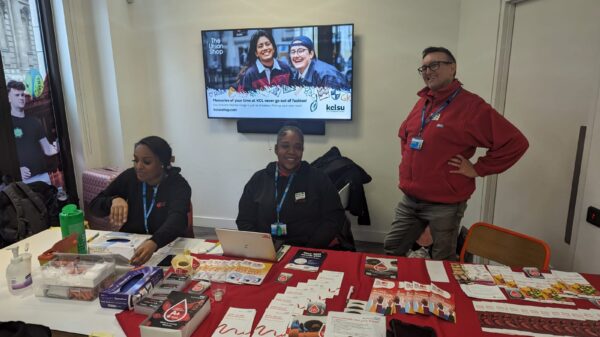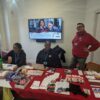Guest contributor Rachael Pajak on her efforts as a volunteer first aider in hospital for St John Ambulance (SJA) during the Covid-19 pandemic.
Sunday, March 24
I was with a friend, enjoying my weekend when my phone buzzed. It was an email from SJA asking for volunteers at Lewisham Hospital’s A&E department, and a simultaneous text from my friend Amber asking if I was going to sign up. With museums, pubs, and public places closed and nothing else to do, I decided to sign up, completely oblivious to what would come next.
As I first entered the hospital, trying to find the training room, I walked past a door taped over like a murder scene, with a sign reading: “DO NOT ENTER: COVID AREAâ€. I thought to myself, “how bad is this disease, actually?”
Peter, an SJA clinical district lead in London and an advanced clinical practitioner at the hospital, explained to us that our role was not a temporary duty, but would probably go on for months. He explained the department was split into two halves: the red, or “dirty†area, and the green, or “clean†area. We were unlikely to work in the red area. As we walked to the simulator room for training, I asked Amber, “So when they say dirty, it means we won’t be dealing with people bleeding and vomiting, right?†Amber scoffed. “No, Rachael, ‘dirty’ means Covid”. After that, I felt nervous; what had I signed up for?
At that point, only a few hundred people in the UK had died of Covid-19. When I got home that night, I watched Boris’ speech to the nation announcing that the UK would be going into lockdown – and thus, the new normal had begun. I signed up to my first shift later that week, where I was thrown into the “Red Majors'” area despite being told it was highly unlikely volunteers would be based there. The last time I was in an A&E majors department in September 2019, it was chaos. A confused cyclist who’s been knocked off his bike was stumbling around unsure where he was; a patient sitting in a wheelchair because there weren’t enough beds, vomiting a bloody-black substance that covered her arms and legs; a mental health patient wailing with her arms dripping in blood.

My first attempt at an ECG while volunteering gone horribly wrong.
This wasn’t a normal A&E. It is the word we are forbidden to say: Quiet. In the Red area, the bays were filled with patients, all with suspected Covid cases, quietly keeping to themselves. Despite the sense of calm and quiet, the section had a very depressing atmosphere, as the hospital is no longer allowing visitors. When a new patient was admitted, I would think: “Am I going to be one of the last people they will ever see or touch? They won’t even be able to see my face, it’s covered with goggles and a mask.”
I never thought I would appreciate that 55% of communication is non-verbal, but having your face covered limits the amount of empathy you can give to your patients. With a mask on it is hard to start a conversation with someone and just as hard to really tell how distressed or anxious a patient may be. These are not the ideal conditions for working in healthcare and providing a service that the NHS is proud of.
Now, several months since lockdown began, things have changed. People are less scared to come into A&E, so things are getting busier, and the Red area has shrunk. Visitors are now welcome back to the hospital to see loved ones. However, the staff are still on standby, ready for the next spike, for the next wave of victims to be struck by this disease, whenever that may be.
Since April, I have moved onto the film and television industry as a “Covid Supervisorâ€, where it’s a struggle to get people to comply with government guidelines that, 3 months ago, they obeyed with religious fervour. I have realised we now live in a rose-tinted world in which people want to go back to work and see their friends and family, putting Covid behind them and toast it away on New Year’s Eve. However, that time has not come yet. Covid-19 does not care how old you are or how healthy you are. If you grow complacent, you will be its next target.
Rachael Pajak

















